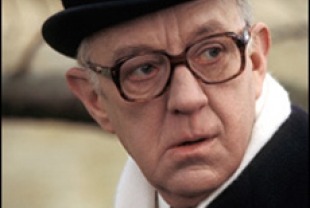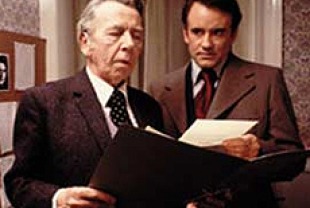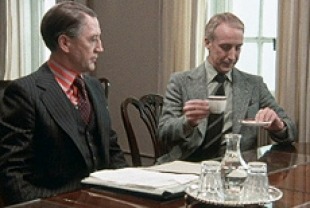This six-hour BBC production of John le Carre's bestselling 1974 novel is a compelling portrait of the spy business and what the author has called "British social attitudes and vanities." Screenplay writer Arthur Hopcraft has fashioned a labyrinthine plot and sophisticated dialogue between all the world-weary characters. Director John Irvin draws out a superb performance from Alec Guinness in his BAFTA-winning role as George Smiley.
This repackaged and discounted DVD 3-Disc set is from Acorn Media which is also releasing its sequel, Smiley's People. Bonus features include a 28-minute interview with John le Carre, production notes, and a glossary of characters and terms.
Even as the Cold War fades into history, the spy drama continues to be popular. From the clandestine operation of the Trojan horse to the wildly successful James Bond blockbusters to the sophisticated espionage tales of John le Carre, we have seen in this fiction genre the potency of secrecy and surprise, the imaginative use of disguise and other subterfuge, the art of lying and misdirection, and the zeal mustered for the battle of good versus evil.
In Tinker, Tailor, Soldier, Spy, John le Carre shows how the once glamorous world of spies — a world of lamplighters (watchers), scalp-hunters (secret agents for dangerous jobs), babysitters (bodyguards) — has become a petty and dishonorable world of backbiting and competition. What was once a calling to a spy has now become a bureaucratic rat race. And behind it all: deception, broken loyalties, and disillusionment.
The setting for this espionage story is postwar England, a time when the Cold War was in full swing. Control (Alexander Knox), the head of the British intelligence service (known as the Circus) sends a key agent (Ian Bannen) on a secret mission to Czechoslovakia. It is top priority trip which may well stop the downfall of the Circus. When it fails, Control is replaced by a new regime consisting of Percy Alleline (Michael Aldridge), Bill Hayden (Ian Richardson), Roy Bland (Terence Rigby), and Toby Esterhase (Bernard Jayston). Then the cabinet minister calls George Smiley (Alec Guiness) out of retirement to find out whether or not there is a mole, a double agent working for the Soviets, in the highest echelon of the Circus. With the help of Peter Guillam (Michael Jayston), his protege; Connie Sachs (Beryl Reed), an old lover; and Ricki Tarr (Hywel Bennett), the agent whose information sets the investigation in motion, this detail-obsessed agent diligently unravels the treachery.
In one of the most chilling scenes in the film, Smiley confronts his nemesis Karla (Patrick Stewart), a Russian agent who has been arrested on immigration charges in India. He attempts to lure this world-class spy to defect and tries every argument he can think of to convince him. Karla doesn't say a word but looks at Smiley with the defiance of a zealot who is confident of his path and his vision of the world.
We sense that the highly ethical Smiley feels tainted by what he has had to do for the Circus and the decisions he has had to make to expose the mole. But despite his diminutive anti-Bond persona, Smiley is somewhat heroic in his mission. And we wholeheartedly support his moral earnestness when he says of his style: "Good intelligence is gradual and rests on a kind of gentleness."
While watching this adaptation of John le Carre's novel, you may find yourself thinking like a secret agent and taking more careful note on what is really going on around you. You might also reflect upon the spy related activities in our society and your own attitudes toward secrets. Here are some questions to get you started:
• What is your reaction to surveillance cameras on the streets and in office buildings? Do you feel they are necessary or do you see them as an invasion of your privacy?
• Are you good at keeping secrets? Why or why not?
• Have your ever assumed another identity on the web or elsewhere? What did that feel like?
• Do you believe that telling the truth is always the best policy?
• What is your response to those who say that little white lies are a slippery slope leading to habitual dishonesty?
• How unscrupulous are you on a scale of 1 to 5? In what situations have you held to the idea that the end justifies the means?


